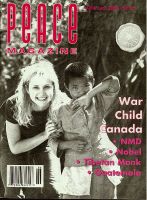
Peace Magazine Apr-Jun 2002, page 31. Some rights reserved.
Search for other articles by PMag staff here
The Federal Court of Canada ruled on March 6 against the federal expropriation of the seabed at Nanoose Bay, stating that the public must be able to object before any such expropriation of provincially owned territory.
The plaintiff, The Society Promoting Environmental Conservation, had objected to the use of the seabed at Canadian Forces Maritime Experimental Testing Range and the province had refused to lease it to the federal government without guarantee that no nuclear weapons would be brought into the area. Major American ports have banned nuclear weapons, but Canada still lets the United States test such weapons in its waters. David Wright, Q.C. says that the next step is for both the provincial and federal governments to decide to accept the wishes of Canadians and ban both nuclear weapons and nuclear reactors from Nanoose Bay and other Canadian waters.
See www.spec.bc.ca
Slobodan Milosevic is running his own legal defence during his war crimes trial in The Hague, but after five weeks, it was not going well for him. He claims that Yugoslavia and Serbia were victims of a Western conspiracy, and that the deportations of Kosovar Albanians and the killing of thousands of civilians in 199 resulted from NATO bombing and terrorism by the Kosovar Liberation Army. Already, however, some American scientists had presented evidence that eliminated the credibility of this defence. Still, Milosevic plans to prove his case by interrogating some 30 Western politicians as witnesses.
But according to journalist Mirko Klarin, Milosevic lost the debate when Paddy Ashdown, the former leader of the British Liberal Democrats and future High Representative for Bosnia-Herzegovina, took the stand. Ashdown, who was an eyewitness, showed that the ethnic cleansing and killing of the Albanian population started at least six months before NATO began bombing. He had visited Albania, Macedonia, and Kosovo in 1998, where he had witnessed "indiscriminate and punitive actions" against civilians by the Yugoslav army and Serbian police. The villagers would be given an ultimatum to evacuate, and then their homes would be plundered, bombed, and finally burned.
Ashdown said he had warned Milosevic at the time that "if you went on acting in this fashion, the international community would have to act, and at the end they did have to act. And I warned you that you would end up in this court. And here you are!"
Against the admonition of the judges, the debate turned political. Ashdown even accepted Milosevic's description of the KLA as a terrorist organization and agreed that the Yugoslav forces had a right to act against terrorism.
Milosevic asked, "So what is the problem, then?" To this, Ashdown replied, "The problem is...the force that was used was excessive, indiscriminate, punitive, and contrary to international law."
Source: Institute for War and Peace Reporting: Tribunal Update NO. 258, March 11-15
Bosnia-Herzegovina was approved for membership in the 43-country Council of Europe on 20 March. It is the fourth former Yugoslav republic to join, following Slovenia, Macedonia, and Croatia. Although Bosnian applied for membership just after its war, only recently was it considered to have met the organization's requirements for democracy.
Source: RFE/RL March 21, 2002.
An agreement was reached on March 14 to replace the Federal Republic of Yugoslavia with a new state called "Serbia and Montenegro." The old Yugoslavia had already disintegrated in warfare, except for those two republics.
Nevertheless, the new agreement is in serious doubt because of political pressures within Montenegro, where the minority coalition government is in crisis. There are new calls for an imminent referendum.
The agreement (which was signed by Montenegro's President Milo Djukanovic and Prime Minister Filip Vujanovic, as well as Serbian Prime Minister Zoran Djindjic and Yugoslav President Vojislav Kostunica) requires ratification by the parliaments of Serbia, Montenegro, and Yugoslavia. However, the Montenegrin coalition is likely to break apart rather than allow that to happen. Strong pro-independence forces also seem unwilling to proceed with the new proposal.
Pyongyang has threatened to withdraw from a nuclear agreement with the United States in reponse to published reports of US plans for possible use of nuclear weapons against North Korea and several other countries. After President Bush's speech labeling North Korea as part of an "axis of evil," the country had already threatened to withdraw from the 1994 agreement to halt their attempts to build nuclear weapons in exchange for American light-water nuclear reactors.

Peace Magazine Apr-Jun 2002, page 31. Some rights reserved.
Search for other articles by PMag staff here